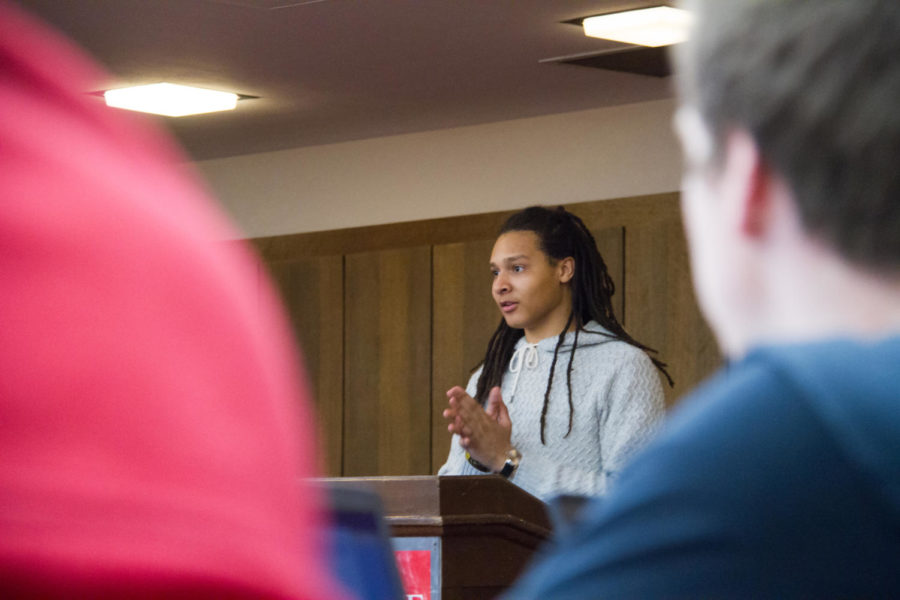- App Content
- App Content / News
- News
- News / Politics And Administration
- News / Politics And Administration / Campus
Student Government continues to seek diversity across all positions
April 5, 2017
Maria Archevald was concerned about her cultural background when she first was seated as a Student Government senator.
Archevald, who was born in Puerto Rico, also carries an accent.
With time, her concern shifted. She grew tired of “sitting in between two men Wednesday after Wednesday.”
Serving as a senator this past academic year, Archevald was one of seven female senators – there are 34 in total. According to the Student Government website, six out of the 23 executive positions and three out of the nine members of the judicial branch are women.
After the election and start of the new session, there are now 13 female senators out of 37.
She recalled one heated debate that dragged on which caused her to object to an extension of five minutes to the debate at hand. The response to that was a 10-minute extension that she objected to again.
Her objection was then called disrespectful by a fellow senator.
“I replied to that, ‘I don’t think the objection is disrespectful,'” Archevald said. “‘What I think is disrespectful is the fact that we’re wasting time’ and I guess that was perceived as an aggressive tone.”
What struck her was that she felt that if it were a white woman, this fellow senator wouldn’t have called her aggressive. If it were a white man, no one would have even thought that he was aggressive.
Archevald also brought up what she regards as “man spreading.” She noticed that as a woman sits, she must think about how her legs are positioned, while a man will sit with his legs wide open with out being judged.
“No one’s going to look at a man talking or a male senator talking and say, ‘Wow, his legs are really spread out,'” Archevald said.
So how does Iowa State’s undergraduate enrollment statistics pale in comparison to the male-to-female ration of Student Government? According to Iowa State’s fall 2016 enrollment statistics, 43 percent of undergraduates identified as female. But in Student Government, only 20 percent of the senate was female.
Archevald said the problem is getting women to run, even though it has been found that women who run for office are just as likely to get elected as men.
Julian Neely, chair for the diversity committee, works to bridge this disparity, among others. Though they have seen an increase in international students and other multicultural students, the senate and Student Government as a whole is still predominately white.
On his agenda coming into this past year was getting senators and cabinet members to interact with different groups on campus whose voices aren’t heard.
“That deals with students who identify as black, African-American, international students,” Neely said. “That deals with LatinX students. Things like that where those identities aren’t really present in senate.”
He added that the LGBTQ+ community and students with disabilities are included on this list.
Neely also worked to educate the student body through several events that gave a platform for students to talk about their identities. One of these was called “You Wouldn’t Know This About Me But.”
Despite the events being sponsored by Student Government, Neely said that only a couple members who weren’t members of the diversity committee attended the event.
“I feel like all of the senate should attend these events just because it is for Student Government, so I feel like you should be there in support and also just to take the opportunity to learn as well,” Neely said.
Cody Smith, who will be inaugurated as Student Government vice president Thursday night, has some plans in mind to improve the diversity of Student Government.
During his and Cody West’s campaign, he said they made sure to reach out to groups with people from all different walks of life.
“We don’t want to be perceived as only white, straight males sitting around in a circle every Wednesday night because I know that is a misconception that some people have,” Smith said.
He sees the gender disparity of Student Government as the result of a societal issue. Smith said he thinks that from the moment members of society are raised women are discouraged from going for that “next rung on the ladder.”
This is why he finds organizations such as the Catt Center for Women and Politics so important.
Smith encourages all students, regardless of background, to get involved with Student Government and use their resources.
If someone feels that they are being discriminated against because of background and feel like their input is being silenced, Smith recommends that they talk to a leader of Student Government because he can’t think of one leader who would not be willing to help.
















